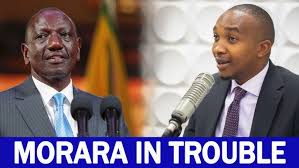Tensions between President William Ruto’s administration and political activist Morara Kebaso have intensified following recent actions by the Kenya Revenue Authority (KRA).
Kebaso, known for his vocal criticism of the government and his declared intention to run for president in 2027, is under investigation for alleged tax evasion amounting to KSh 27 million.
The KRA alleges that, despite his businesses generating over KSh 186 million in the past three years, Kebaso has consistently filed nil tax returns.
The KRA’s scrutiny extends to five of Kebaso’s companies, including Morara Home Furniture and Morara Properties Limited, as well as six vehicles registered in his name.
Kebaso has denied the allegations, presenting tax compliance certificates for 2023 and 2024 as evidence of his adherence to tax obligations.
He contends that the investigation is a politically motivated attempt to undermine his activism and presidential ambitions.
This development follows Kebaso’s recent arrest by the Directorate of Criminal Investigations (DCI) in September 2024, after police raided his office in Kahawa Sukari, Nairobi.
Although he was released on bail, the arrest has been perceived by some as part of a broader strategy to suppress dissenting voices critical of the current administration.
The escalating confrontation between President Ruto’s government and Morara Kebaso has raised concerns about the state of political freedoms in Kenya.
Observers fear that the use of state agencies to target political opponents could set a concerning precedent, potentially stifling democratic discourse and limiting the space for legitimate political opposition.
As the 2027 elections approach, the situation underscores the need for vigilance in upholding democratic principles and ensuring that state power is not misused to silence dissent.


